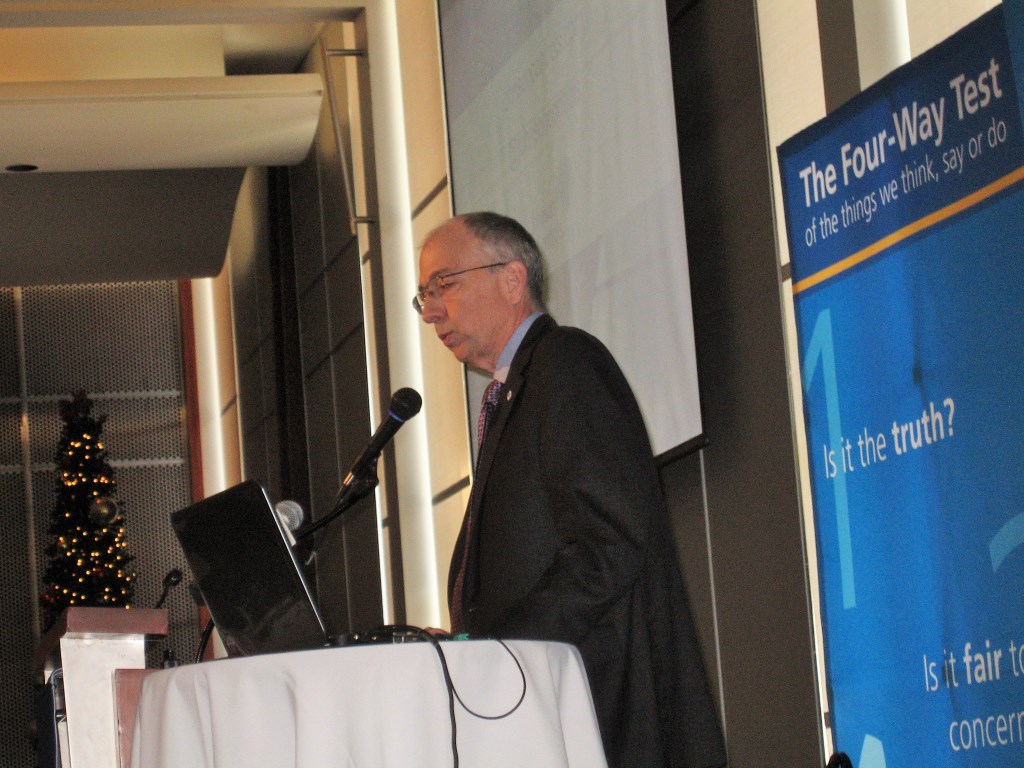Johnson Controls Will Shrink, CEO Says
Molinaroli speaks frankly: company will spin off auto seats division, reposition its stock.
To hear Alex Molinaroli put it, the pressures a Fortune 500 CEO faces to increase profitability sometimes verge into the existential.
Molinaroli runs Johnson Controls, Inc. [NYSE:JCI], Wisconsin’s largest firm and 66th on the list of the largest United States corporations, with 2015 revenues of over $30 billion.
“We are an industrial company, but we are seen as an automotive company,” Molinaroli said Tuesday at the regular meeting of the Rotary Club at the War Memorial Center. And therein lies the existential rub.
This mixed identity creates “confusion in the market,” Molinaroli said, where the “risk of the cyclical automotive business gets transferred to the entire business” of Johnson Controls.
In dollars and cents terms, the company’s stock trades at a discount due to its connection with the volatile automotive industry. In metaphysical terms, the whole is worth less than the sum of its parts.
Johnson Controls, as the CEO sees it, faces an imminent threat of being bought and dismembered by an “activist investor” seeking quick profits.
Molinaroli’s plan: “We will not be a victim to an activist investor. We will be our own activist. We want to be a manufacturer, and a manufacturer of scale,” or what Molinaroli calls a “multi-industrial” company.
This will require further downsizing at the company as it adjusts its focus. Dismantling it before an outside raider does it for him.
Gone is the company’s 40,000+-employee workplace solution division which managed real estate and facilities worldwide, sold about 5 months ago to CBRE. “We didn’t want service-only business,” Molanaroli said, adding that it did not provide added value to the company.
Next for separation: the automotive seating division that will be based in Milwaukee in the 833 building. It will be spun off later this year.
That will leave JCI with its Building Efficiency and Power Solutions divisions, providing mechanical systems and batteries worldwide in a company Molinaroli hopes will then be freed of the cycles of the automotive industry.
By spinning off the automotive seating business, “we are going back to our [industrial] roots,” Molinaroli said. Perhaps then the marketplace will be better able to understand Johnson Controls and better value its stock, which is trading at a three-year low, despite rosy earnings projections.
Milwaukee was known for beer, since people bought lots of it and beer is a heavily branded consumer product.
But Johnson Controls is a business-to-business manufacturer, and its products bear the names of others like Bosch, Sears, Heliar, LTH, MAC, Optima and Varta. These battery brands are sold in the hundreds of millions of units and are the leading sellers in South America, Mexico, Europe and Asia. Household names, to hear Molinaroli tell it.
“We have a very large share, especially starter batteries,” Molinaroli said, referring to the original equipment that automakers include in their vehicles. JCI is big in the aftermarket, too. “If you’ve been to Interstate, O’Reilly, Sears — that’s our battery,” he said.
The company also hides behind its brands in the building division, where it owns such names as York, Hitachi, Luxaire, Sabroe and Champion. Johnson Controls also makes Coleman heating and air conditioning products for the company long known to campers for its portable lights and cookstoves.
“But people here are not really sure what we do,” Molinaroli said. “In Detroit we’re known as an auto company,” since that is the lens through which Detroit views the world.
He says that most Milwaukeeans might know the company from its service trucks, and relate it to the building industry. But virtually everybody on earth has sat in a Johnson Controls seat, been in a building run by its mechanicals, or owned or ridden in a vehicle powered by one of its batteries.
Milwaukee’s Role In Company Future
Molinaroli emphasized the global nature of his business, and the role that Milwaukee is expected to play in it in upcoming years.
“It is important to attract talent,” he said, and “Milwaukee is going through a change. Milwaukee needs to be global-friendly, to welcome ex-pats from Germany, China and Mexico where they can get around and eat in restaurants they like.” (Molinaroli was a champion of the streetcar.)
“Young people want to be part of the community,” he said, and the “expats want to live in the city.”
But Molinaroli said he was concerned by crime, or the perception of it, saying that Downtown must be made safe. (In fact, Downtown has historically been the safest part of the city.) Molinaroli said he had heard on the radio that some 45 cars had been stolen over the first few days of the year, and this concerned him. “I heard it on the radio, so it must be true,” he joked to the audience of some 200 Rotarians and guests.
What about electric cars? Certainly as a battery maker, Molinaroli must be enthused, a questioner asked.
In fact, Molanaroli the metaphysicist came to the fore on that question. The technology for electric vehicles is here, but the economics are not. He said the internal combustion engine and hybrid cars will still lead the market for the next decade. In 2025, he said, electric vehicles will still be a “niche market,” as he put it. His buddies, with their fancy Teslas, gave him a hard time on this subject, he said. “But you’re not normal people!,” he told them.
About that Office Tower
Johnson Controls has been the center of much speculation that it would develop an office tower downtown in the near future. A questioner asked Molinaroli his plans.
“An office tower downtown?” Molinaroli responded. “I’ve heard anything from 50 to 80 stories,” Molinaroli joked. He says the company’s master plan commits it to Milwaukee, “but we haven’t made a decision. We have lots on our plate [with the corporate reorganization], so there is no big announcement.”
Shanghai HQ Underway
Molinaroli shared some pointers about the global marketplace. For one thing, he said, the languages spoken in his company’s regional headquarters in Shanghai, where you would expect to hear Mandarin or English, include a good deal of Spanish. He truly does run an international company, with ex-pats around the globe.
Molinaroli said all business relationships come down to personal contacts and trust. As a corollary, he said that it is impossible to run his huge enterprise strictly from Milwaukee, and that there is considerable autonomy for offices around the globe, like the impressive new building under construction in Shanghai.
“We do one third of our business in Asia, with two-thirds of it in China. Think of the middle class — most will be in cities, and three-quarters to four-fifths of them will be in Asia.
“If we don’t make our name in China now, we won’t be able to do it in five or ten years.” Even China will know about this company before its neighbors in Milwaukee do.
Any Regrets on Loss of Auto Business?
As Johnson Controls seeks a name for itself in China and in its hometown, Molinaroli expressed one regret at leaving the automobile business behind. Original Equipment Manufacturers were insistent on quality products first time, every time, and Molinaroli said he incorporated that philosophy and strategy throughout the firm.
“One thing I hope to not lose is the automotive quality that the OEMs insisted on,” he said.






















Despite his problems with Joe Zada, Molinaroli seems to have his head on straight when it comes to ensuring the future of Johnson Controls.
That said, whenever I read about him speaking of JCI’s future in Milwaukee, I get the distinct impression he’s preparing Milwaukee for the possibility of keeping the car seat company but losing–to some degree or all together–the pared down JCI. Maybe its posturing to cut a sweet deal on a new headquarters, but I its clear the big problems are Milwaukee’s lack of a “cosmopolitan threshold” and problems of flying globally (or even from the coasts) into and out of Mitchell.
Expect a second headquarters (likely Chicago, perhaps in the New York region) and more of a token presence in Brewtown.
I doubt the city would give them 250K to study the lakefront for a possible new HQ if they were planning on skipping town.
I suspect this is posturing for a TIF deal.
JC isn’t going anywhere and their hq is going to be built in Milwaukee
Milwaukee can, and should do everything in its power to bring JCI HQ to downtown Milwaukee. Unfortunately however, the City will probably do what is minimally necessary to bring these jobs home. The fact that JCI is entertaining other Cities is the first problem. The second problem are your local politicians. You can’t have a world-class cosmopolitan metropolis without jobs.
Because the City of Milwaukee didn’t do what was needed to keep NML downtown? Because the City didn’t offer Kohl’s substantial financing packages to try and lure them downtown?
In 2025, he said, electric vehicles will still be a “niche market,” as he put it.
Forward thinking in reverse. I will take that bet.
And why not look beyond 2025, maybe because Tesla is so far ahead in battery technology? They have all ready lost. Battery technology is not only good for cars but also solar energy that is booming world wide.